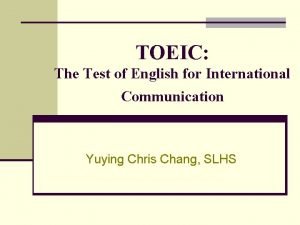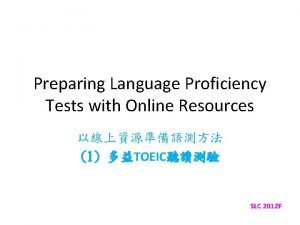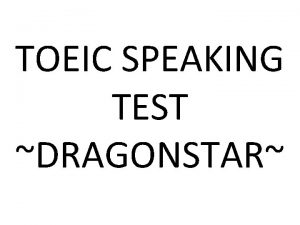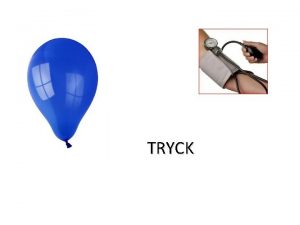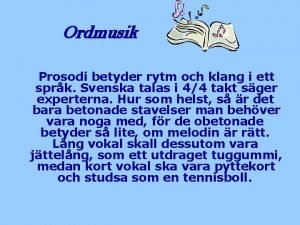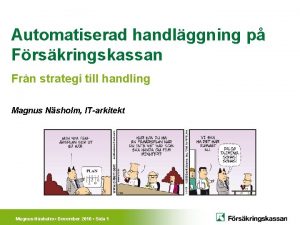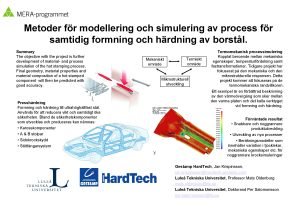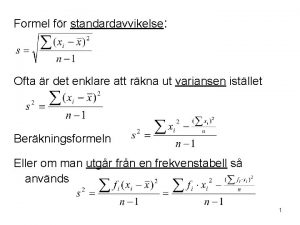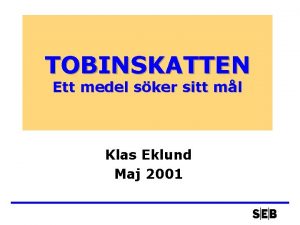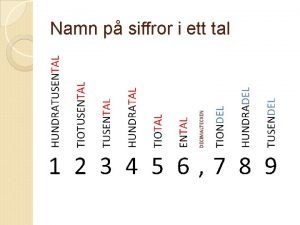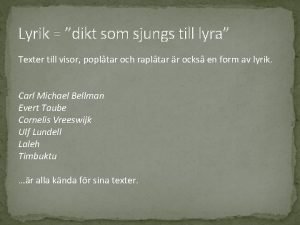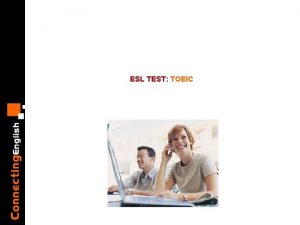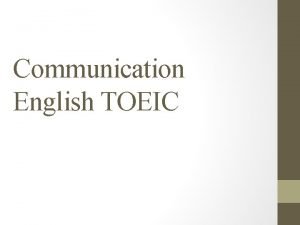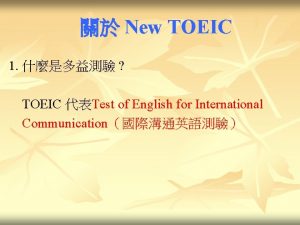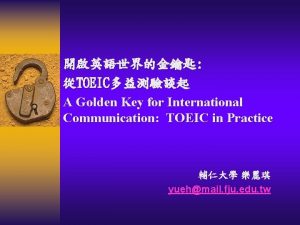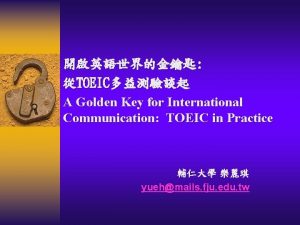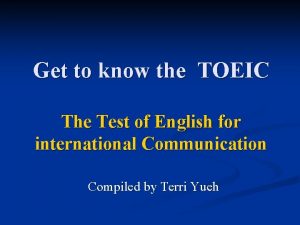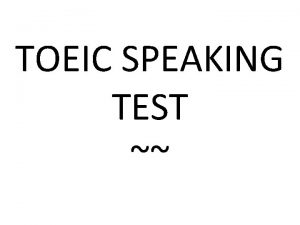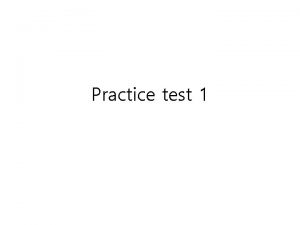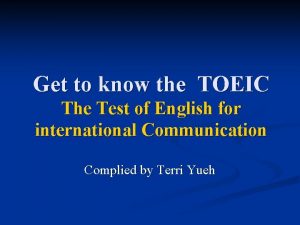Test of English for International Communication TOEIC TOEIC




























































- Slides: 60

Test of English for International Communication TOEIC / TOEIC BRIDGE

¿Qué es TOEIC? El Test of English for International Communication (TOEIC) es un examen de Inglés profesional para personas que no tienen el inglés como lengua materna. Mide las capacidades y competencias de los trabajadores en su entorno de laboral.

¿Qué es TOEIC? Está diseñado para evaluar los conocimientos de inglés en un entorno profesional. Al igual que el TOEFL, este examen lo realiza ETS (Educational Testing Service), una empresa norteamericana con sede en Princeton (New Jersey). A nivel mundial cada año realizan TOEIC 5, 5 millones de personas, siendo el test de medición de Inglés profesional más empleado en el mundo.

¿Qué es TOEIC BRIDGE? Es una versión simplificada de TOEIC que apunta a un inglés básico en intermedio y consiste en 100 preguntas de selección múltiple con un puntaje máximo de 180 puntos El TOEIC Bridge se utilizó en Chile como parte del SIMCE 2011.

¿Por qué TOEIC Bridge? Uno de los objetivos del Programa de Inglés de DUOC UC es certificar que sus alumnos poseen un nivel del idioma inglés adecuado para desenvolverse en el mundo laboral en Chile y el extranjero. TOEIC y TOEIC Bridge son una forma auténtica de hacerlo pues son exámenes con estándares y validación internacionales.

¿Qué mide el TOEIC Bridge? Competencias relacionadas con la comunicación oral & auditiva Competencias relacionadas con la lecto – escritura ESCUCHAR HABLAR LEER ESCRIBIR

TIEMPO 30 MINUTOS üDatos Personales ü Instrucciones de sección Auditiva 25 MINUTOS 1, 30 horas ü Desarrollo de sección Auditiva ü Instrucciones de sección Escrita 35 MINUTOS ü Desarrollo de Sección Escrita 1 hora

ESTRUCTURA PRIMERA SECCIÓN SEGUNDA SECCIÓN Competencias relacionadas con la comunicación oral & auditiva Competencias relacionadas con la lecto – escritura ü Duración: 25 minutos ü 50 preguntas ü 3 partes ü Guiada por una grabación que no se repite, no se retrocede y el tiempo entre preguntas esta cronometrado dentro de la misma grabación, para que puedan contestar. Parte 1 Fotografías / 15 preguntas Parte 2 Preguntas & Respuestas / 20 preguntas Parte 3 Conversaciones Cortas / 15 preguntas ü ü Duración: 35 minutos 50 preguntas 2 partes Trabajo a ritmo propio con tiempo límite Parte 4 Frases Incompletas / 30 preguntas Parte 5 Compresión de Lectura / 20 preguntas

FORMATO

FORMATO ü 100 preguntas de selección múltiple ü Duración: 1, 30 horas. ü 25 formas posibles todas equivalentes. ü Dos secciones: Auditiva & Lectura ü Formato lápiz y papel. ü Consta de: 1 cuadernillo, hoja de Respuestas, cuestionario de antecedentes, Material de Audio, lápiz grafito n° 2, Goma de borrar. ü No se descuenta por respuestas malas. Se sugiere contestar la mayor cantidad de preguntas. ü Toda la prueba tiene indicaciones tanto en la grabación como en el cuadernillo. Adicionalmente se dan las instrucciones en el idioma nativo para asegurarnos que puedan dar una buena prueba. ü Se sugiere siempre contestar directamente en el cuadernillo. No hay tiempo para traspasar respuestas.

CERTIFICADO

BENEFICIOS ü Comprender el valor de las Competencias en inglés en el mundo Laboral. ü Importante herramienta de gestión curricular: Factor diferenciador que permite potenciar la visibilidad de nuestras competencias a través un indicador claro, preciso y concreto. ü Favorece empleabilidad – Nuestra experiencia con nuestros clientes en procesos de selección. Bolsa de Trabajo. ü Punto de partida para iniciar mi capacitación: ¿Dónde estoy? ü Permite fijar nuevas metas en el proceso de aprendizaje concretas y alcanzables: ¿Para dónde voy? ü Monitorea el progreso en el proceso de aprendizaje: ¿Cómo voy?

I don´t like working on weekends UNIT 10

Eight Important Job Skills 1. 2. 3. 4. 5. 6. 7. 8. p. 64 Can you solve problems? Do you work well with people? Can you use a computer? Can you teach others how to do things? Are you good at math and science? Can you manage money well? Do you speak other languages? Can you manage other people? Which of these skills do you think are the most important? Why? Which skills do you have?

What is the most important job skill for a/an … 1. 2. 3. 4. 5. 6. 7. 8. Can you solve problems? Do you work well with people? Can you use a computer? Can you teach others how to do things? Are you good at math and science? Can you manage money well? Do you speak other languages? Can you manage other people? marine biologist?

What is the most important job skill for a/an … 1. 2. 3. 4. 5. 6. 7. 8. Can you solve problems? Do you work well with people? Can you use a computer? Can you teach others how to do things? Are you good at math and science? Can you manage money well? Do you speak other languages? Can you manage other people? flight attendant?

What is the most important job skill for a/an … 1. 2. 3. 4. 5. 6. 7. 8. Can you solve problems? Do you work well with people? Can you use a computer? Can you teach others how to do things? Are you good at math and science? Can you manage money well? Do you speak other languages? Can you manage other people? detective?

What is the most important job skill for a/an … 1. 2. 3. 4. 5. 6. 7. 8. Can you solve problems? Do you work well with people? Can you use a computer? Can you teach others how to do things? Are you good at math and science? Can you manage money well? Do you speak other languages? Can you manage other people? professor?

What is the most important job skill for a/an … 1. 2. 3. 4. 5. 6. 7. 8. Can you solve problems? Do you work well with people? Can you use a computer? Can you teach others how to do things? Are you good at math and science? Can you manage money well? Do you speak other languages? Can you manage other people? travel and tourism employee?

What is the most important job skill for a/an … 1. 2. 3. 4. 5. 6. 7. 8. Can you solve problems? Do you work well with people? Can you use a computer? Can you teach others how to do things? Are you good at math and science? Can you manage money well? Do you speak other languages? Can you manage other people? programmer at Apple?

What is the most important job skill for a/an … 1. 2. 3. 4. 5. 6. 7. 8. Can you solve problems? Do you work well with people? Can you use a computer? Can you teach others how to do things? Are you good at math and science? Can you manage money well? Do you speak other languages? Can you manage other people? accountant?

Conversation – I need a job! LISTEN 22 B. What else does the job require? Speak at least one other language

NOTES GERUNDS WITH SHORT RESPONSES

GERUNDS WITH SHORT RESPONSES In English, a gerund is a verb that ends in –ing. walking talking working

GERUNDS WITH SHORT RESPONSES When you talk about something you’re good at (que haces bien) or something that you like or love, and also something you hate, it’s common to use a gerund. I like traveling. I hate working on weekends. I’m good at using a computer.

GERUNDS WITH SHORT RESPONSES When a person says an affirmative statement (doesn’t have a negative word) you can agree or disagree: ejemplo 1 I love working on weekends. AGREE • So do I. • Me too. • I do too. DISAGREE • Oh, I don’t. • Oh, not me. • Really? Not me.

GERUNDS WITH SHORT RESPONSES When a person says an affirmative statement (doesn’t have a negative word) you can agree or disagree: ejemplo 2 I am good at using a computer. AGREE • So am I. • I am too. • Me too. DISAGREE • Gee, I’m not. • Not me.

GERUNDS WITH SHORT RESPONSES When a person says an negative statement you can agree or disagree. How do you know something is negative? NOT don’t can’t (do not) (cannot)

GERUNDS WITH SHORT RESPONSES When a person says an negative statement you can agree or disagree. ejemplo 1 I don’t mind working long hours. AGREE • Neither do I. • Me neither. DISAGREE • Well, I do.

GERUNDS WITH SHORT RESPONSES When a person says an negative statement you can agree or disagree. ejemplo 2 I’m not good at selling. AGREE • Neither am I. DISAGREE • I am.

GERUNDS WITH SHORT RESPONSES When a person says an negative statement you can agree or disagree. ejemplo 3 I’m not interested in talking on the phone. AGREE • Neither am I. DISAGREE • Oh, I am!

Practice 1. I’m good at solving problems. ? affirmative negative So am I. ? agree disagree

Practice 2. I can’t stand making mistakes. ? affirmative negative I don’t mind. ? agree disagree

Practice 3. I love eating at Mc. Donald’s. ? affirmative negative Gross! I don’t. ? agree disagree

Practice 4. I enjoy learning foreign languages. ? affirmative negative I do too! ? agree disagree

Practice 5. Selena loves listening to Justin Bieber. ? affirmative negative Well, I don’t. ? agree disagree

Practice 6. I’m not good at making decisions quickly. ? affirmative negative Oh, I am. ? agree disagree

1. lawyer

2. flight attendant

3. teacher

4. architect

5. salesperson

6. manager

7. accountant

8. videogame programmer

Activity 3, Part A 1. 2. 3. 4. 5. 6. 7. 8. I don’t like… I’m not very good at… I’m good at… I hate… I can’t stand… I’m interested in… I don’t mind… I enjoy…

Choosing the Gerund… 1. I… a. likes traveling often. b. like travel to other countries. c. like traveling often. 4. My mom… a. hate cooking dinner all the time. b. like cooking dinner all the time. c. hates cooking dinner all the time. 2. He used to … a. enjoy biking but now he don’t. b. enjoy to bike but now he 5. John … doesn’t. a. don’t like going to class on c. enjoy biking but now he Monday. doesn’t. b. doesn’t enjoy to take tests. c. hates doing projects. 3. She… a. is good dancing. b. isn’t good at dancing. c. don’t like dancing.

Activity 5, p. 66 LISTEN 25 Activity 3, p. 71 LISTEN 29

Activity 6, p. 66 Pair work: IN ENGLISH, ask your partner how they feel about each chore.

The Chilean government is offering a robot to all students! • The robot can do only 2 chores for you. Decide which ones from Part A on p. 66 you want it to do for you. FIRST SENTENCE Use the infinitive of the verb ejemplo I want the robot to do my homework for me. I hate doing my homework. SECOND SENTENCE Use the gerund

Google WHAT’S YOUR DREAM JOB?

Top 10 Reasons to Work at Google. 1. Lend a helping hand. With millions of visitors every month, Google has become an essential part of everyday life – like a good friend – connecting people with the information they need to live great lives. 2. Life is beautiful. Being a part of something that matters and working on products in which you can believe is remarkably fulfilling. 3. Appreciation is the best motivation, so we’ve created a fun and inspiring workspace you’ll be glad to be a part of, including on-site doctor; massage and yoga; professional development opportunities; shoreline running trails; and plenty of snacks to get you through the day. 4. Work and play are not mutually exclusive. It is possible to code and pass the puck at the same time. 5. We love our employees, and we want them to know it. Google offers a variety of benefits, including a choice of medical programs, companymatched 401(k), stock options, maternity and paternity leave, and much more.

Top 10 Reasons to Work at Google. 6. Innovation is our bloodline. Even the best technology can be improved. We see endless opportunity to create even more relevant, more useful, and faster products for our users. Google is the technology leader in organizing the world’s information. 7. Good company everywhere you look. Googlers range from former neurosurgeons, CEOs, and U. S. puzzle champions to alligator wrestlers and Marines. No matter what their backgrounds, Googlers make for interesting cube mates. 8. Uniting the world, one user at a time. People in every country and every language use our products. As such we think, act, and work globally – just our little contribution to making the world a better place. 9. Boldly go where no one has gone before. There are hundreds of challenges yet to solve. Your creative ideas matter here and are worth exploring. You’ll have the opportunity to develop innovative new products that millions of people will find useful. 10. There is such a thing as a free lunch after all. In fact we have them every day: healthy, yummy, and made with love.

VIDEO http: //www. youtube. com/watch? v=wf. KZC 94 nsxk Mountain View, California Google’s Headquarters

Interchange 10 Dream Job With a partner 1 st person: hiring manager Write several questions for the interview. �“Useful Questions” �Use vocabulary p. 64/65 2 nd person: applicant Write responses to the interview questions. �Use job description �Use vocabulary such as job traits on p. 64

Word Power, p. 67 Personality Traits bad-tempered creative critical disorganized efficient forgetful generous Listening 26, Part C hardworking impatient level-headed moody punctual reliable strict

Perspectives, p. 67 Listening LISTEN 27 What would you choose? Why?

Grammar Focus, p. 68 Clauses with because The word because introduces a cause or a reason. I’d make a good journalist because I’m good at writing. I could be a teacher because I’m very creative. I wouldn’t want to be a teacher because I’m very impatient. I could never be a stokebroker because I can’t make decisions quickly. PART A

Could you be… • I wouldn’t want to be a (job) because… • I would never be a (job) because… • I’d like to be a (job) because… I couldn’t be a (job) because… I’d make a good (job) because…

Prepare for the QUIZ! (Second class next week!) Unit 10 Written Quiz: Activity 3 Listening (p. 71) Activity 4 Discussion (p. 71) Unit 9 and 10 Oral Quiz Unit 9 — Activity 1 Speaking (p. 70) Unit 9 — Activity 2 Game (p. 70) List of questions for the quiz (next class)
 The test of english for international communication
The test of english for international communication Toeic uqam
Toeic uqam Toeic speaking questions
Toeic speaking questions On monday salinas products a large food distributor
On monday salinas products a large food distributor Toeic bridge certificado
Toeic bridge certificado Kontinuitetshantering
Kontinuitetshantering Novell typiska drag
Novell typiska drag Tack för att ni lyssnade bild
Tack för att ni lyssnade bild Ekologiskt fotavtryck
Ekologiskt fotavtryck Shingelfrisyren
Shingelfrisyren En lathund för arbete med kontinuitetshantering
En lathund för arbete med kontinuitetshantering Underlag för särskild löneskatt på pensionskostnader
Underlag för särskild löneskatt på pensionskostnader Tidböcker
Tidböcker Anatomi organ reproduksi
Anatomi organ reproduksi Vad är densitet
Vad är densitet Datorkunskap för nybörjare
Datorkunskap för nybörjare Stig kerman
Stig kerman Att skriva en debattartikel
Att skriva en debattartikel För och nackdelar med firo
För och nackdelar med firo Nyckelkompetenser för livslångt lärande
Nyckelkompetenser för livslångt lärande Påbyggnader för flakfordon
Påbyggnader för flakfordon Vätsketryck formel
Vätsketryck formel Publik sektor
Publik sektor I gullregnens månad
I gullregnens månad Presentera för publik crossboss
Presentera för publik crossboss Teckenspråk minoritetsspråk argument
Teckenspråk minoritetsspråk argument Vem räknas som jude
Vem räknas som jude Treserva lathund
Treserva lathund Mjälthilus
Mjälthilus Bästa kameran för astrofoto
Bästa kameran för astrofoto Cks
Cks Byggprocessen steg för steg
Byggprocessen steg för steg Bra mat för unga idrottare
Bra mat för unga idrottare Verktyg för automatisering av utbetalningar
Verktyg för automatisering av utbetalningar Rutin för avvikelsehantering
Rutin för avvikelsehantering Smärtskolan kunskap för livet
Smärtskolan kunskap för livet Ministerstyre för och nackdelar
Ministerstyre för och nackdelar Tack för att ni har lyssnat
Tack för att ni har lyssnat Referatmarkering
Referatmarkering Redogör för vad psykologi är
Redogör för vad psykologi är Matematisk modellering eksempel
Matematisk modellering eksempel Tack för att ni har lyssnat
Tack för att ni har lyssnat Borra hål för knoppar
Borra hål för knoppar Orubbliga rättigheter
Orubbliga rättigheter Relativ standardavvikelse formel
Relativ standardavvikelse formel Tack för att ni har lyssnat
Tack för att ni har lyssnat Rita perspektiv
Rita perspektiv Informationskartläggning
Informationskartläggning Tobinskatten för och nackdelar
Tobinskatten för och nackdelar Toppslätskivling dos
Toppslätskivling dos Datumr
Datumr Egg för emanuel
Egg för emanuel Elektronik för barn
Elektronik för barn Fredsgudinna pax
Fredsgudinna pax Strategi för svensk viltförvaltning
Strategi för svensk viltförvaltning Kung dog 1611
Kung dog 1611 Ellika andolf
Ellika andolf Romarriket tidslinje
Romarriket tidslinje Tack för att ni lyssnade
Tack för att ni lyssnade Samlade siffror för tryck
Samlade siffror för tryck Dikt rimma
Dikt rimma
